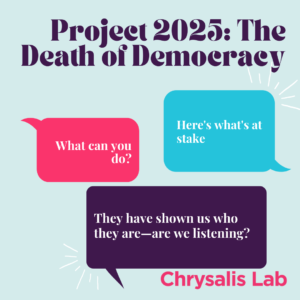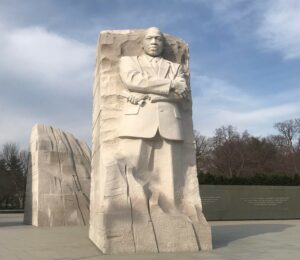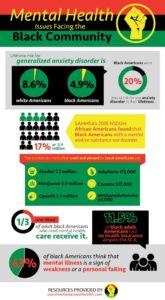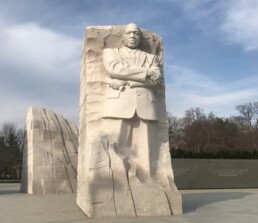The Power of the Small
December 5th marks the anniversary of the Montgomery Bus Boycott, which served as the springboard for the Civil Rights Era. In 1955, the Montgomery bus boycott began in Alabama in response to Rosa Parks' arrest for refusing to give up her seat on a municipal bus to a white man. The African American community organized the boycott until December 20, 1956, when a U.S. Supreme Court ruling integrated the public transportation system.
The boycott organization reminds us of Margaret Mead's quote: “Never doubt that a small group of thoughtful, committed citizens can change the world. Indeed, it is the only thing that ever has.”
This seems particularly relevant today as individuals and groups consider how to address the current tax on democracy, DEI, voting rights, and other recent reversals of inclusionary actions. If we look back on what the citizens of Montgomery were able to accomplish, it doesn’t appear overwhelming or insurmountable.
As we highlight the bus boycott, we want to acknowledge the role of women. In 1946, the Women’s Political Council (WPC) started protesting the Montgomery city buses. The WPC also played a pivotal role, organizing it through a door-to-door campaign in a matter of days. As a result, most of Montgomery's 50,000 African American residents participated in the boycott. They walked, carpooled, took taxis, or hitchhiked to get to work or school.
In reflecting on the outcome, King said of the bus boycott: “We came to see that, in the long run, it is more honorable to walk in dignity than ride in humiliation.” King’s role in the bus boycott garnered international attention, and the tactic of mass nonviolent protest became the model for challenging segregation and racial oppression in the South.
Project 2025: The Death of Democracy

"Believe people when they tell you who they are. They know themselves better than you." Maya Angelou
Project 2025 is not just a policy proposal; it's a direct threat to our democracy. Designed to consolidate executive power if the Republican nominee wins the 2024 presidential election, this right-wing plan aims to reshape the federal government in an authoritarian, Christian nationalist image.
Here's what's at stake:
- Erosion of the Rule of Law: Project 2025 would undermine the separation of powers and civil liberties, erasing the checks and balances that protect our democracy.
- Rising Inequality: This plan seeks to normalize white supremacy and disproportionately harm Black Americans by slashing funding for education, healthcare, and social programs.
- Attack on Rights: A draconian abortion ban, elimination of affirmative action, and the rollback of diversity, equity, and inclusion efforts are just the beginning.
- Healthcare Access: Imposing work requirements on Medicaid would further racial inequality, burdening Black Americans who already face significant employment barriers.
What can you do?
Vote. This November, your vote is your voice. Reject any candidate that supports Project 2025 and its extremist principles.
Stay Informed. Understand the impacts of these policies on our communities and stand up for those who will be most affected.
Take Action. Mobilize, advocate, and speak out against this radical agenda.
The stakes have never been higher for Black Americans and our democracy. We must keep Republicans out of office until they shed their extremist ideologies.
They have shown us who they are—are we listening?
Act now. Protect our democracy. Vote against Project 2025.
They have told us who they are; the question is are we listening??!!
Voting is King

"If you don't vote, you don't count".
-Fannie Lou Hamer
Dr. Martin Luther King, Jr. was a courageous Civil Rights leader who inspired millions of people to use love as the highest principle for social reform. As we pause to honor his life and legacy, let us remember his lifelong passion and commitment to securing equality for all Americans through political representation. In a 1957 speech titled "Give Us The Ballot," Dr. King spoke about the need for equal voting rights:
"So long as I do not firmly and irrevocably possess the right to vote I do not possess myself. I cannot make up my mind — it is made up for me. I cannot live as a democratic citizen, observing the laws I have helped to enact — I can only submit to the edict of others."
In March 1965, Martin Luther King Jr. vowed to continue fighting for the right to vote:
“Let’s march on ballot boxes until race-baiters disappear from the political arena. Let us march on ballot boxes until the salient misdeeds of bloodthirsty mobs will be transformed into the calculated good deeds of orderly citizens.”
Five months later, the Voting Rights Act became law to prohibit tactics designed to eradicate the African American vote. Within months of its passage, a quarter of a million new Black voters had been registered. Within four years, voter registration in the South had more than doubled. In 1965, Mississippi led the nation in both African American turnout –74 percent–and the number of African American leaders elected. By 1969, African American voter turnout in Tennessee was 92.1 percent; Arkansas, 77.9 percent; and Texas, 73.1 percent.
Dr. King’s resolution to fight for voting rights resonates now more than ever. In 2024, as we honor Dr. King on his birthday, voting rights are under siege beset by a wave of attacks. Unabashedly lawmakers nationwide, with the support of a conservative Supreme Court, have reconstructed barriers to the voting process through copious strategies including discriminatory redistricting, slashing access to early voting and polling locations, particularly in Democratic leaning communities or urban areas, and indiscriminately removing people from the voter rolls, all with intent of weakening the influence and impact of Black and brown voters. Locally, Georgia Republicans are arguing that the end of affirmative action also means that we must eliminate race-based redistricting which will ultimately reduce the influence of Black voters.
As Stacey Abrams stated, “[o]ur ability to participate in government, to elect our leaders and to improve our lives is contingent upon our ability to access the ballot. We know in our heart of hearts that voting is a sacred right - the fount from which all other rights flow.’ Protecting democracy requires a collective effort. Americans must safeguard the democratic principles that the United States is built upon which includes the fundamental right to allow citizens to participate in the decision-making process. We must remain vigilant and work together to defeat all forms of voting restriction measures and other potential threats to democracy particularly when we know the attacks are rooted in racism and an unfettered assault on the freedom and future of the Black community. As we remember Dr. King, we must not rest. In 1965, we were fighting to get the right to vote without coercion and corruption. In 2024, we must fight that we keep it.
Let Justice Roll Down Like a River
This is part of our 2023 "Holiday Highlights" series to showcase some of the
partners and projects Chrysalis Lab has worked with this year.
“The Chrysalis Lab team is amazing! They delivered usable analysis in a timely and cost-effective manner. Their process was thoughtful, respectful, and thorough. They were able to glean relevant organizational needs and trends, while delivering suggestions steeped in sector wisdom and best practices. They were a joy to work with.” Doug Ammar, Executive Director, Georgia Justice Project
Chrysalis Lab understands the profound need for co-created social solutions that are adaptable and sustainable to help transform leaders, organizations, and communities for the greater good. Because of this, the Georgia Justice Project (GJP) invited Chrysalis Lab to assess the current and future needs of the organization to maximize impact and outcomes. The goal of our assessment was to determine the most effective organizational structure and systems that align with the way forward for GJP.
The Georgia Justice Project has been extremely successful in fulfilling its mission of breaking down barriers to opportunity for Georgians impacted by the criminal justice system. GJP has won numerous awards and has been recognized for its innovative and transformative work in criminal justice reform. The holistic approach - casework, advocacy, and social services - to reducing recidivism and supporting the families of their clients makes GJP perfectly positioned to demonstrate the type of disruptive impact needed to tackle the issues within the judicial system. As GJP prepared to set its path for future growth, they acknowledged a need to assess and re-tool aspects of its core infrastructure critical to sustaining impact.
Our assessment process included reviewing key documents – annual reports, job descriptions, organizational charts, the previous strategic plan, and other key resources - to help us gain useful context on the organization. We also surveyed key internal stakeholders to distill assumptions, old and new perspectives, and helpful insights. In addition, we interviewed GJP board members and senior leadership. This data set allowed us to provide recommendations that addressed GJP’s operational structure, new or re-tooled systems, and key performance indicators that aligned with desired operational excellence.
The Chrysalis Lab team acknowledged the work that GJP had done to establish a strong reputation and culture. But with such influence comes a deep responsibility to build an organization that can continue to foster and nurture organizational growth. Now that our recommendations are fully implemented, GJP will be perfectly positioned for sustained success for many more years. We look forward to even greater enhancements in program outcomes and organizational culture, operations that improve delivery of impactful services and information to key stakeholders, and a brand that will be worthy of sizeable strategic investments in the future. More importantly, GJP is clearly poised to continue to be successful and impactful in the lives of its constituents.
Embracing Gratitude: A Thanksgiving Reflection
In many respects, 2023 has been a tumultuous year. The war in the Ukraine has continued and another war in the Middle East has been rekindled. In both instances, we have witnessed the tragic loss of countless innocent lives and the dramatic and permanent scarring of the lives of millions. Closer to home, as we entered the post-COVID era, we are experiencing unsurprising setbacks in diversity, equity, and inclusion efforts and political and economic landscapes around the globe teeter on uncertainty.
Nevertheless, as Thanksgiving approaches, it's a time for reflection, gratitude, and appreciation. Even in the midst of our pain, sorrow, and uncertainty, we must take a moment to take a deep breath and acknowledge our blessings. A moment to appreciate our personal strengths, individual accomplishments, and indomitable resilience. We are thankful for the lessons, experiences, and challenges that have contributed to the personal development and spiritual growth of each of us, and embrace the opportunity to continually evolve and expand our horizons.
Thanksgiving is a celebration of togetherness. An opportunity to cherish the bonds with family, friends, and colleagues that uplift, support, and bring joy by acknowledging the people who make our life’s journey meaningful. Don’t be afraid to let them know how much you appreciate them.
In today’s world, kindness can often be overshadowed and undervalued. Let's reflect on the acts of generosity, compassion, and love that have impacted us throughout the year, and pledge to be kinder and gentler in the days, weeks, and years to come.
As we embark upon our daily lives, it's easy to overlook the beauty that surrounds us. Take a moment to marvel at the wonders of nature— the cool breeze of autumn, the colorful falling leaves, the beauty of undulating landscapes, and the serenity it brings. Remember – you are nature’s greatest creation. That's plenty to be thankful for!
As we gather with family and friends during this holiday season, let's also gather our thoughts and hearts in gratitude. In practicing gratitude, we open ourselves to a world of positivity, joy, and interconnectedness. This Thanksgiving, Chrysalis Lab prays that gratitude will be the centerpiece of our celebrations, guiding us toward a future filled with greater appreciation and compassion for all.
Moving Beyond Hope by Casting More Black Votes
“We have to build our own power. We have to win every single political office we can, where we have a majority of Black people…”
-- Fannie Lou Hamer
This month, another election cycle ensues. Voting is unequivocally the most essential civic duty and holds particular importance for Black people in the United States. Voting provides Black people with the power to influence the direction of our communities. By participating in elections, we can elect representatives who share our values and address our concerns.
At its core, voting equates to exercising power and allocating resources. Elected officials determine how our tax dollars are spent, which directly affects our daily lives. By electing individuals who prioritize our interests and champion initiatives that support our well-being, we ensure our tax dollars benefit our families and communities. Abstaining from voting essentially endorses those who may not share our values.
It’s not enough for Black people to say we care about our communities. We must prepare ourselves to fight for and advocate in all ways possible for the issues that impact our well-being, especially those associated with ensuring fairness in our voting rights. Ultimately, our vote is the arbiter of whether our interests are genuinely valued and respected in this country.
Participating in the electoral process is just as important today as it was prior to and during the Civil Rights era. The recent and widespread changes to voting practices, redistricting, and voter identification laws are designed to suppress voters of color and silence our collective voices The number of eligible Black voters in the United States, now nearly 33 million, has been growing. Yet, racism remains a persistent thread in American culture, consistently working to deny and dilute the influence and power of Black people.
No one gets the right to vote because they ask for it. People get the right to vote because they organize themselves, one community at a time. The struggle is ongoing, as the structures of power continually attempt to deny Black Americans their right to vote, all under the guise of the law. As Frederick Douglass said, “Power concedes nothing without a demand. It never has and it never will.”
Efforts to deny Black people the right to vote and/or to steal their votes is constant and pervading. A recent study by the Democratic Party of Virginia reveals a concerning trend: mail-in ballots from Black voters are flagged for rejection at a significantly higher rate than those from white voters. Presently, 4.8% of Black voters' ballots are flagged, while only 2.8% of white voters' ballots face the same fate. In Richmond, city officials flag more than 11% of ballots from Black voters, compared to about 5.5% of those from white voters. The rejection rate for Black voters remains more than twice as high as that for white voters.
In the face of pervasive white supremacy, Black Americans are in for a long and arduous struggle. Our unwavering commitment to constituting a genuine democracy in America has remained a constant throughout our history in this country. Now more than ever, African Americans must use every means at our disposal to avenge our enslaved ancestors, including exercising our right to vote. We must vote for people who have our best interests in mind. We must vote for issues that advance the well-being of our families and communities. We must vote because we’re empowered to do so as full American citizens. We can’t expect to win every election, but if we don’t vote, we will most assuredly lose.
Mental Health & Community
According to the World Health Organization (WHO), one in four people will struggle with a mental illness at some point during their lives. However, not every racial group is equally impacted. Racism has a profound, deleterious impact on the mental health of African Americans. The Centers for Disease Control (CDC) has declared racism a serious threat to public health. In the African-American community, mental health issues are often compounded by the psychological stress of systemic racism. As a result, African Americans are 20 percent more likely to report serious psychological distress than Whites, and just one in three African Americans who struggle with mental health issues will not receive appropriate treatment.
The traumatic experience of racism includes overt acts of physical and verbal aggression, but they also include indirect stressors, such as witnessing instances of police brutality on social media or enduring subtle yet harmful microaggressions. These insidious forms of racial trauma perpetuate stereotypes and prejudices, leaving an indelible mark on one’s sense of self ultimately influencing their mental well-being.
Racism also appears in the less obvious, but no less traumatic manifestation of micro aggressions-- subtle, often unintentional slights that reinforce racial bias and animus. Examples range from a store clerk persistently shadowing a Black customer to a person of color being mistakenly assumed to be a service worker. Due to their frequency, these microaggressions can gradually erode a person's sense of self-worth and identity, exacerbating the mental health burden borne by African Americans and members of other marginalized communities.
Racial trauma can also be passed down through intergenerational transmission. Stress can cause changes to reproductive cells as well as to the uterine environment where a fetus develops. Because of this, people whose ancestors experienced trauma may be more vulnerable to mental health conditions. This has tremendous mental health implications for descendants of Black people. Traumatic experiences of racism include physical and verbal attacks, while indirect stressors include seeing videos of police brutality on social media or being the target of subtle putdowns.
At Chrysalis Lab, we recognize that racism/white supremacy are unhealthy mental constructs. That’s why, through our equity work, we encourage leaders and influencers to adopt an introspective approach. We recognize that before any individual can exhibit racist behavior, they must harbor biased thoughts, assumptions, and predispositions about others. By challenging and dismantling these erroneous beliefs, we aim to foster positive, inclusive behaviors and empower individuals and organizations to transcend cultural biases, thereby contributing to a more just and equitable society.

August Blog: Last Day of Black Philanthropy Month
As we close out Black Philanthropy Month (at least we get a full 31 days unlike the other month
designated for us to celebrate our history), but I digress. Side note - if I’m being really honest,
prior to writing this blog, I wasn’t even sure of the origins of Black Philanthropy Month and what
its purpose was/is. For those out there like me - here’s what I learned: Black Philanthropy Month
was created in 2011 by Dr. Jackie Bouvier Copeland and the Pan-African Women's
Philanthropy Network. It’s an annual, global celebration of African-descent giving. So essentially
it’s a time for us to /celebrate how we - as Black people - give, which oftentimes looks very
different from what mainstream traditional philanthropic giving looks like. I digress again - that’s
for another blog.
What I’ve been thinking a lot about lately is what it means to be a Black practitioner or
professional working within the field of philanthropy. What are the extra responsibilities we carry
as we work to move resources to Black-led organizations and communities of color? As a self-
proclaimed “recovering funder” (Thank you, Dr. Janelle Williams, Co-Founder and CEO of the
Atlanta Wealth Building Initiative for letting me borrow that term), I often think about the
challenges that come with being Black and in philanthropy. Yes - it comes with its privileges -
access to rooms, access to resources (resources we’re almost always reminded of that don’t
belong to us), access to information, and social capital. But navigating the philanthropic field also
comes with a great deal of responsibility. The responsibility of deciding who gets what and how
much of these limited resources that aren’t our own, which often translates into deciding who
doesn’t get something or anything. This process of picking and choosing which non-profit
leaders of color to elevate and build a deeper relationship with isn’t easy. In fact, it immediately
thrusts you into a position of power and hierarchical ranking - a place that we all fundamentally
know doesn’t feel right. Hell, if it were up to me (and if the resources were mine), I’d give out as
much and as often as possible - few questions asked. Simply based on the fact that I
understand our history and know that this country was built on the backs of free Black labor. So
there’s much repair and replenishing that needs to happen. No questions asked! But I digress
again, because it’s not my money, so I often find myself having to make difficult decisions - ones
that don’t always feel right when I think about how to best support and help my own Black
people and communities. Because the truth of the matter is, those often closest to the ground
doing the work within our communities are often not the ones “presentable” to our trustees.
Then it becomes an exploration of - which organizations and leaders - do I think can pass
muster? Who can I sneak by them? Which ones can I convince my board and trustees to invest
in? And then it’s up to me - as the middle woman (aka “gatekeeper”) - to deepen the relationship
with that leader of color to help them navigate what it means to be in partnership with a
traditional funder. Which then leads me to think about what it means to hold someone
accountable with love or in a way that allows for missteps but grace? How do I allow this Black
leader to show up as their authentic self and allow them to remain that way without having to
shape-shift in order to convince my trustees that they’re worthy of resources? When you pause
to think about it, and I’ve had 5 years out of the field to reflect, it’s not an easy place to be. It’s
nuanced and fraught with challenges and complexities. And I suspect that for those of us who
stay in the field long enough, we get weary and tired of “having to make the case.” I don’t have
any easy answers for my Brothers and Sisters in the field, but I do know that without you/us
there at the table - we’d likely be even further behind…or would we? But I digress, that’s for
another blog: What ways do we as Black people hold white supremacy in place because some
of us are beneficiaries of the perceived privileges it brings? Maybe I’ll tackle that topic next
time.
One Year Later--Troubling the Waters to Heal the World
I have the pleasure of serving on the Board of Directors of the Auburn Seminary. For over 200 years Auburn has identified and strengthened leaders – from the pulpit to the public square – to build communities, bridge divides, pursue justice, and heal the world. In October 2021 Rev. Dr. Emma Jordan-Simpson was named President of Auburn.
One of Auburn’s core values is ‘truth telling’ –the belief that powerful communication, giving voice, and listening deeply, are critical to manifesting a new reality. Please find below powerful words of reflection Emma shared today as we relive the horrendous acts of a year ago and the devastating impact it will have on the future of our country and all of our lives. Today let’s not sit idle, but take the opportunity to answer the clarion call for each of us to ‘trouble the waters’; to earnestly work to achieve reconciliation, peace, and justice in order to manifest a new reality and heal the world.
Kim
.
In the United States of America, January 6th is the day that a sitting president unwilling to accept the will of the people and intent on remaining in power, incited a mob to violence at the People’s House. It was a failed attempt at a coup. Failed for now, I should say. History has shown us what happens when countries have ignored the same, when they cheapened the call for healing by holding no one accountable for rupture and breach. I remember watching the footage of the violence at the Capitol one year ago and thinking that this tragedy may not just be about lies and disinformation. Maybe the violence that unfolded before us on that day was also one of the many consequences of our inability to sit with and hold truths.
Truth-telling and truth-holding is the work and imperative of our times because there can be no justice and no peace – no life and flourishing – that does not begin there. Equally as imperative is the relief we need from weaponized truths.
As you face today – January 6th – I offer you a poem Maya Angelou read at the United Nations some years ago – “A Brave and Startling Truth.” I’m including the video because who can resist the peace of her regal image, who can resist listening to her commanding voice? May the hope, possibility, and truth she invokes in her poem inspire us to show up today, wherever we are today and with whatever is the work given to our hands today, with a hunger for a more authentic connection with each other and a willingness to work for a world where all belong.
Here’s the video of Maya Angelou reading “A Brave and Startling Truth.”
Because the news and media will be showing the violent footage nonstop today, I encourage you to take good care of yourselves, friends. If you want to be in community, you might also sign up to attend one of the many virtual Democracy Vigils taking place across the country this evening.
Sending love and New Year Light,
Emma Jordan-Simpson
President, Auburn Seminary
Life Among the Symbols
It is the definition of exhaustion: debilitating and humiliating, to live your life in and among symbols that celebrate the belief that you are inferior, lazy, and immoral, even bestial. Buildings, streets, schools, parks and public spaces that honor men who simultaneously progressed and profited on the backs of the very ingenuity and diligence that you have persistently and resiliently deployed.
Over your lifetime – and that of your great grandmother, grandmother, children and grandchildren – you learn to overlook and avoid these hurtful symbols, becoming numb or maybe compartmentalizing them in your mind as “the past,” something that your own experience has by now taught you is not always pretty or deserving of remembrance. You assess your progress, your blessings and your own wonderfully diverse friends who you know don’t feel that way. You ground and reground yourself by remembering that the need to subjugate you has always been driven by a fear of you and the greed of others.
This is what it feels like to go to Lee Elementary school or (Stonewall) Jackson Park, walk on Stone Mountain or sit in rooms lined with grim, framed visages of pale men who reviled you (I’ll never forget when I learned the history of Joel Hurt, who built the building in which I worked for nearly 15 years. As documented in “Slavery By Another Name,” by Douglas Blackmon, Hurt cavalierly built his wealth and fame on the backs of black convict labor, harshly disciplined and cruelly deprived of their most basic civil rights. I loved that building and thought (still think) it gorgeous. Yet from that point on, every click of my heel on those marble floors brought to mind the clang of chains on men who looked like my husband and brother).
Then Charlottesville happens and you’re reminded that to many these symbols do in fact mean the SAME thing today as they did 200 years ago.
All sheroes and heroes are not created equal. While Lee may have been a brilliant strategist, it matters that he honed his skill by fighting to keep a nation in chains. Appreciating the fruits of men who broke ground on a new Atlanta must be reconciled with their tearing apart of families through an organized system of human chattel.
So you say “enough.” Enough of avoided conversations and living surrounded by these ugly reminders and smiling through it. So you act. You speak up, cry, and march. Sometimes the emotion goes too far and you lash out destructively.
And then you are criticized for not being civil enough and adequately containing your pain. For not successfully monitoring the pent up frustration and being your most noble self. You’re accused of equal responsibility, impact and intent as those who advocate the same hateful perspectives of those whose names adorn the walls and corners that shout their disdain.
It feels familiar. Blame the Victim. Deflect. Discourage. Discredit. The table’s now turned.
The script has flipped.
First published February 16, 2018 at http://edgeofopportunity.blogspot.com/


